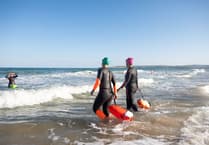The RNLI is advising the public to visit lifeguarded beaches and learn the lifesaving float technique to stay safe as the second May bank holiday weekend and Whitsun half term week approaches.
Sixty six beaches in the south west will be patrolled by RNLI lifeguards from Saturday, May 24 with patrols returning on a number of the region’s beaches as the 2025 season roll-out continues, including east Devon and Jersey.
Although the settled weather looks set to change, many people are still expected to visit the south west coast to make the most of the long weekend and half term week ahead. The RNLI is encouraging people to head to a lifeguarded beach and swim between the red and yellow flags.
Henry Saddler-Irvine, Regional Lifeguard Lead, said: “Our lifeguard teams have had a great start to the 2025 season with the recent settled, warm weather seeing many people head to the coast to make the most of the conditions. Our teams are finishing their latest round of inductions this week before patrols begin at more beaches from this weekend to coincide with the bank holiday weekend and half term.
“If you’re heading to the coast next week please do visit an RNLI lifeguarded beach where our team of highly-trained and skilled lifeguards will be on duty to advise of the conditions and keep you safe within the red and yellow flagged zone.’
The single piece of advice which the RNLI is urging the public to remember, share and practise is: If you find yourself struggling in water, Float to Live.
Emmie Seward-Adams, South West Water safety delivery support, said: “Instinctively, most people who find themselves struggling in the water will begin to panic, swim, or thrash about. We’re urging people to ignore this instinct and remember to float: Tilt your head back, with your ears submerged. Relax and try to breathe normally.
“Move your hands and legs to help you stay afloat if you need to. It’s fine if your legs sink – we all float differently. By doing this, you give yourself the chance to rest and recover your breathing. Once you’ve regained control of your breathing, you can call for help or swim to safety.
“The seas around our coasts are cold enough year-round to trigger cold water shock, while waves and rip currents can overpower even the most experienced water users. This advice could be a lifesaver for anyone who is heading to the water – even those who are experienced, and those who have no plans to enter the water.’
The charity’s advice for anyone struggling in the water is ‘Float to Live’:
Tilt your head back, with your ears submerged
Relax and try to breathe normally
Move your hands and feet to help you stay afloat
It’s fine if your legs sink, we all float differently
Practise floating in a local pool if you can.
If you see someone else struggling in water call 999 or 112 and ask for the Coastguard. Tell the person to relax and float on their back. Throw something buoyant to help them stay afloat.





Comments
This article has no comments yet. Be the first to leave a comment.